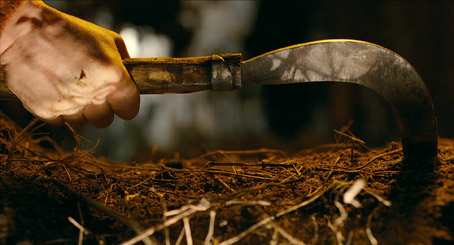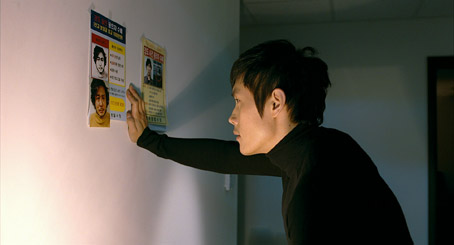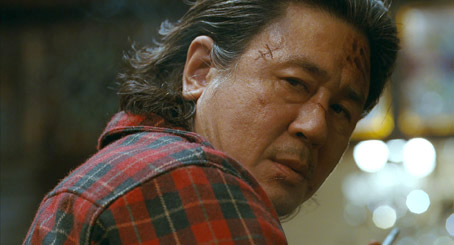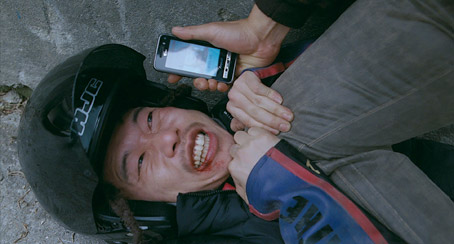"Don't be so weak. This is just the beginning. Remember this...
you're nightmare's only going to get worse." |
A vengeful Soo-hyun just before plunging a
scalpel into his victim's achilles tendon |
In movies at least, revenge is traditionally presented as a cathartic experience, one in which a grave injustice is corrected through physical violence. The appeal of the genre is hardly surprising given that it plays on our own, perhaps primal response to personal insult and injury. If, for example, you ever took a playground beating, did you really want to see the bully given detention or even expelled for his actions, or did you secretly dream of being a kung-fu master and kicking seven bells of shit out of the little bastard? Thus when a movie hero or his family suffer at the hands of a malicious other, we're almost programmed to want to see them make that tormentor pay, to make the retribution personal and act out what we, in an alternate universe with no moral or emotional consequences, would want to do in their place. At least that's the theory.
And, on an emotional level at least, it works. Revenge movies can, in their way, be immensely satisfying, and it's only when you take a step back that you become aware of what you've participated in, an over-simplification of reality in which extreme acts provoke similarly extreme responses, something we are encouraged to view in binary oppositional and almost biblical terms, the sword or righteous justice being brought to bear on evil men. And we are talking men here, for although the rape/revenge sub-genre has seen women become as vengeful as their male counterparts, it's almost always men who are the targets for retaliatory action.

This does mean that by default revenge movies tend to adopt a right-wing stance, one in which the system favours the criminal and almost any act against decent upstanding citizens is punishable by extreme violence or death without trial. The crimes themselves are often presented in tabloid terms, cut-and-dry abominations that allow no right-thinking person to sympathise with the perpetrator. More recently the focus has narrowed to very specific acts, the absolute favourite being paedophilia or child murder, or in extreme cases both. Label your villain a paedophile and you don't have to bother with troublesome things like character development and narrative complexity – this guy's a bastard and thus deserves everything bad that subsequently happens to him. Too often this is a sign of laziness on the part of filmmakers whose key interest is in dishing out violence and are too willing to settle for an off-the-peg solution to bad guy development.
All of which changed when Korean cinema, or specifically a filmmaker named Park Chan-wook, got in on the act. Park's rightly celebrated Vengeance Trilogy rethought and reinvigorated the genre with three films that leave you with one overriding certainty, that the act of revenge will likely prove as damaging to the revenger as to their intended target. And while the killing of children figures in two of the films, the handling of subsequent events is far from the genre norm – in Sympathy for Mr. Vengeance the death is accidental and prompts audience sympathy for the victim's kidnappers, while in Lady Vengeance the horror of what it really means to take violent revenge is vividly captured in the image of a line of wronged parents tooled up with knives and dressed in protective plastic, waiting squeamishly for their turn to inflict harm on the killer of their children.
I Saw the Devil [Akmareul boatda] doesn't so much take its cue from Park as try to one-up him, at least in the brutality of its violence and the casting of Choi Min-sik – the tortured prisoner from Oldboy and the child murderer from Lady Vengeance – as one the most loathsome movie serial killers I've ever encountered. Kyung-chul is a man who kidnaps women and dismembers them alive in a grubby workroom kitted out for the purpose, for no other reason than the pleasure of doing so. We first meet him in the opening scene when he stops and offers help to a young woman named Joo-yeon, who is waiting in her car for an overdue tow truck. At this point we don't actually know who he is, but we've all seen enough films to know that vulnerable looking women and hooded strangers do not mix well in isolated spots in the dead of night. Joo-yeon politely declines the stranger's help and he walks away, but in one of those heart stopping moments that you just know is coming, he returns with a bang, breaks into the car and beats her unconscious. What Kyung-chul doesn't know is that just prior to the attack, Joo-yeon was on the phone to her fiancée Soo-hyun (Lee Byung-hun), a respected government agent who becomes understandably distraught when her severed head is recovered on waste land, and vows to track down and take very personal revenge on her killer.

From an early stage, director Kim Ji-woon – who made his reputation with the likes of A Tale of Two Sisters, A Bittersweet Life and The Good, The Bad and The Weird – puts a very Korean stamp on the tone of his tale. This is particularly evident in the disturbingly workaday grubbiness of Kyung-chul's approach to his appalling task, as he ignores the pleas of his victim and coldly prepars for her dismemberment like a mechanic gathering tools to work on a car. It's also visible in the blackly farcical clumsiness of the local police, who in an effort to shield discovery of Joo-yeon's severed head from a flock of reporters inadvertently provide them with a grisly photo opportunity when they drop the box in which it's contained and send it tumbling across the ground.
Joo-yeon, it turns out, was not just Soo-hyun's fiancée, but the daughter of police squad chief Jang, and unbeknown to Soo-hyun was pregnant when she died. And it was her birthday. Boy does director Kim like to pile it on. Soo-hyun is granted two weeks leave, and with Jang's unofficial blessing and a tracking device smuggled to him by his sympathetic partner, he photographs police records and goes in search of his unknown prey. Those familiar with Korean police thrillers will not be too surprised at the approach he takes, which involves tracking down suspects and them beating them violently into terrified cooperation, which in the case of the first unfortunate involves taking a hammer to his testicles. Kyung-chul, meanwhile, is out cruising for his next victim.
Just how much to reveal about what comes next is a difficult call, as there are a fair few surprises (for some the biggest shock will be what Kyung-chul does for a living), and about a third of the way in there's a turn of events that had me wondering just where the film would go next. What develops is a cat-and-mouse game in which Soo-hyun initially has Kyung-chul at a major disadvantage that he plays with merciless gusto, irrespective of the suffering to others that indirectly results. But Kyung-chul proves to be as resourceful as his opponent and every bit as ruthless, and his complete lack of morality and desperation to survive eventually puts him on an even keel with his tormentor, prompting his occasional partner in crime Tae-joo to comment with wry amusement on Soo-hyun's transformation: "the advent of a monster – how interesting."

As a revenge thriller, I Saw the Devil does try to have it both ways, wringing dark visceral thrills from Soo-hyun's nick-of-time arrivals and righteous violence while simultaneously asking us to appreciate that his actions have moral and physical consequences for both himself and anyone who inadvertently strays into the game zone. There is a nagging sense that director Kim was determined to crank the nastiness a couple of notches above what had gone before, and I'm not completely convinced that Kyung-chul's misogyny doesn't sometimes seep into the film itself (women here are almost exclusively victims of male aggression and abuse), another step down a path that sooner or later really is going to result in a film that is genuinely impossible to even uncomfortably sit through. For some, this is the film that does just that – it even prompted one IMDb user to proclaim it evil and implore those who enjoyed it to change their minds, a comment that attracted all the ridicule it deserved. Frankly, with the current bar set by A Serbian Film, I'd say Korean revenge cinema has a little leeway yet.
Kim regular Lee Byung-hun makes for an icily determined and fiercely driven Soo-hyun, but it's Choi Min-sik who steals the film as Kyung-chul in a performance of such fiery intensity and unbridled menace that from the very first scene you absolutely know that he is capable of just about anything. As a whole the film is neither as morally or thematically complex as the Vengeance Trilogy nor as consistently gripping as Na Hong-jin's 2008 The Chaser [Chugyeogja], despite having clear ambitions in both camps. But if the hybrid approach is its principal weakness, it also proves to be a surprising strength, as the expectations of the traditional revenge drama are both met and then usurped by the previously upright Soo-hyun's gradual descent into amoral barbarism. The technical handling is consistently impressive (the vicious, dizzyingly shot taxi knife attack is a horrifying show stopper), and in spite of its thematic schizophrenia, it's a consistently involving and often gripping journey into the sort of dark territory that Korean cinema has pretty much made its own. It also, just occasionally, has a real flair for black humour, as when Kyung-chul murders two men and discovers that they were in the midst of a killing spree of their own and that he was their next target, or in the image of Kyung-chul's partner-in-crime Tae-joo, at a moment of considerable tension, struggling to pull out the screwdriver that has impaled his hand to a workbench, only to have its handle fly off instead.
A lovely 1.85:1 transfer that sings a hymn to the continuing beauty of both 35mm and the Blu-ray delivery format. The sharpness and level of detail is exceptional throughout, particularly evident in the skin textures, clothing and the detail in Cho Hwa-sung's seedy production design – even the snowflakes in the opening scene are eye-catchingly rendered. The contrast is a little strong in places, but for the most part is bang-on without sacrificing the all-important inky black levels (a lot of the film takes place at night), and the colours really pop when they need to. An excellent job.

The DTS-HD Master Audio surround track is similarly impressive, with a dynamic range that is crystal clear from the crispest treble to the deepest bass note, a standard that only the sometimes flatter sounding dialogue intermittently falls slightly short of. The separation is distinct, with the full sound stage purposefully (though never flashily) employed. An LPCM stereo soundtrack is also available, which scores on clarity but is neither as inclusive or subtle as its DTS counterpart.
Interviews (19:05)
An interview with director Kim Ji-woon – who enthuses about his leading men, explains why he chose to film a revenge story, and justifies the violence – is followed by snippets of grabbed interviews with actors Choi Min-sik and Lee Byung-hun. Both men discuss working with director Kim; Lee reveals how much he learned from his co-star, while Choi complains about the beatings he took during the course of the shoot.
Making of (18:12)
A welcome collection of behind-the-scenes footage that is both technically revealing – there was clearly more location work than I suspected and some scenes were shot in surprisingly low light using supplemented practical lighting – and sometimes rather fun. The cheerful banter between the two leading men should prove uplifting medicine for anyone left a rattled by the conflict between their characters, and we briefly meet a group of camera-shy members of the Choi Min-sik fan club.
There's also a Teaser Trailer (0:53) and a TV Spot (1:44), both reasonable sells without giving too much away.
Those with a fondness for Korean crime movies will at least be partially prepared for the level of violence and the dark places you'll visit in I Saw the Devil. But if you're hardy enough then it's a gripping and appropriately disturbing ride, and showcases the formidable Choi Min-sik at the top of his game. Optimum's Blu-ray may be a little light on extras, but it looks and sounds fabulous and thus still comes recommended, but even the hardened should proceed with a little caution.
|